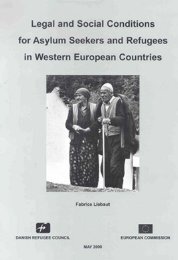Bulgaria - The social impact of seasonal migration
Bulgaria - The social impact of seasonal migration
Bulgaria - The social impact of seasonal migration
Create successful ePaper yourself
Turn your PDF publications into a flip-book with our unique Google optimized e-Paper software.
34<br />
<strong>The</strong>re are a few Afghan immigrants who had settled successfully in S<strong>of</strong>ia. <strong>The</strong> majority<br />
<strong>of</strong> them work at Iliiantsi market, "where the atmosphere is better for foreigners - there are<br />
Arabs there, all kinds <strong>of</strong> foreigners" (interview No. 14). <strong>The</strong>se migrants trade with Turkish<br />
goods, and are satisfied with the conditions in <strong>Bulgaria</strong>. <strong>The</strong>y have bought apartments,<br />
houses and have integrated. For example, a former colonel with 6 children, who is at<br />
fight with his relatives in Afghanistan - thus cannot return - prepares food at home, sells<br />
it at Iliiantsi and manages to survive. Some representatives <strong>of</strong> the Afghan community<br />
are very poor and receive financial help from richer relatives in the west, sometimes<br />
with the mediation <strong>of</strong> the embassy (interview No. 14).<br />
Otherwise the permanent Afghani residents in <strong>Bulgaria</strong> are about 150 families, <strong>of</strong> 4-5<br />
people each, the majority <strong>of</strong> whom are former students in <strong>Bulgaria</strong>. <strong>The</strong>y have two<br />
organisations - a “Cultural Society” and an “Afghan Society” - yet both <strong>of</strong> them are not<br />
particularly active, owing to the deep political divisions among the refugees. Some <strong>of</strong><br />
the members are mujahiddins, others are Communists, while those apolitical are not<br />
welcome anywhere. Afghan children attend <strong>Bulgaria</strong>n schools and speak <strong>Bulgaria</strong>n<br />
better than their parents. Some <strong>of</strong> the children do not even speak the Persian language,<br />
while others are enrolled in secondary school No 18 in S<strong>of</strong>ia which teaches Persian,<br />
Chinese, Arab, etc. At this moment, the presence <strong>of</strong> Afghan immigrants in <strong>Bulgaria</strong> is at<br />
its lowest level ever. According to a high-ranking <strong>of</strong>ficial <strong>of</strong> the Afghan embassy in S<strong>of</strong>ia,<br />
<strong>Bulgaria</strong> is a transit country for his co-nationals, who pass through <strong>Bulgaria</strong> on their way<br />
to the west. Transit Afghan migrants are thousands, and they travel without notifying the<br />
embassy. Yet their number declines, because <strong>of</strong> 3 reasons - better control on the<br />
<strong>Bulgaria</strong>n-Turkish border from both sides, the wave <strong>of</strong> former refugees who return to<br />
Afghanistan after the start <strong>of</strong> the reconstruction <strong>of</strong> the country, and the poverty <strong>of</strong><br />
Afghani in their homeland who do not have 5-6 000 USD so as to emigrate to the west.<br />
<strong>The</strong> Afghan embassy expects that many <strong>of</strong> the Afghan immigrants to <strong>Bulgaria</strong> will return<br />
to their homeland after a 2-year period <strong>of</strong> active reconstruction there, and the first to go<br />
back will be those with humanitarian status, who are in the worst situation here<br />
(interview No. 14).<br />
2.3. Conclusions<br />
<strong>The</strong>re is no precise unified methodology for observing e<strong>migration</strong> trends and this leads to the<br />
conclusion that there is an urgent need <strong>of</strong> elaborating such a methodology and establishing<br />
<strong>of</strong> a stable, publicly accepted information database on the processes <strong>of</strong> e<strong>migration</strong>, that<br />
would be able to take account <strong>of</strong> the period <strong>of</strong> staying abroad. <strong>The</strong>re are no data about<br />
<strong>seasonal</strong> <strong>migration</strong>, let alone the irregular one. Keeping track <strong>of</strong> the number <strong>of</strong> irregular<br />
emigrants is a very difficult task that requires more efforts and coordination among<br />
different institutions, both <strong>Bulgaria</strong>n and foreign ones. A possible partial solution might<br />
be the regular gathering <strong>of</strong> information from the <strong>Bulgaria</strong>n municipalities about the size<br />
and destination <strong>of</strong> <strong>seasonal</strong> <strong>migration</strong>.<br />
Data from the national censuses conducted in 1992 and 2001 showed that between these<br />
two censuses approximately 196 000 people emigrated from <strong>Bulgaria</strong>, while the number<br />
<strong>of</strong> persons who have returned or settled to <strong>Bulgaria</strong> was a total <strong>of</strong> 19 000. Net <strong>migration</strong><br />
from <strong>Bulgaria</strong> is negative, amounting to roughly 177 000 people who had left the country<br />
in 1992-2001, or an average <strong>of</strong> 22 000 people leaving <strong>Bulgaria</strong> yearly. Other data (<strong>of</strong> state<br />
agencies, newspaper articles and interviews) show a significantly larger number <strong>of</strong><br />
emigrants.

















